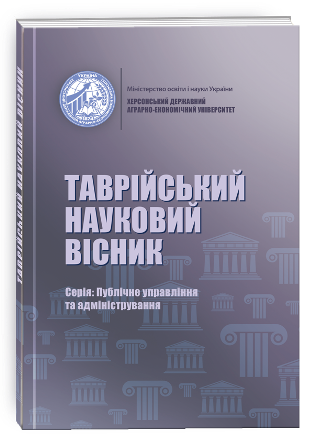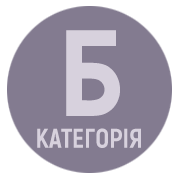FORMATION OF ENVIRONMENTAL COMPETENCE IN SECONDARY EDUCATION INSTITUTIONS IN THE CONTEXT OF INTEGRATION INTO THE EUROPEAN EDUCATIONAL ENVIRONMENT
DOI:
https://doi.org/10.32851/tnv-pub.2023.1.2Keywords:
environmental education, competencies, educational institution development strategy, priority directionAbstract
The article considers the problem of the formation of environmental competence in students and the role of secondary education institutions in this process. The article considers the problem of the formation of environmental competence in students and the role of secondary education institutions in this process. The analysis of the State Standards of primary and basic secondary education showed that the formation of environmental competence should be based on the formation of an understanding of the need for rational use of nature, compliance with the rules of environmental protection behavior, compliance with measures to the conservation of nature in order to ensure the sustainable development of modern society. It was established that the overall result of environmental education and upbringing is the formation of environmental competence in students, i.e. sustainable knowledge, skills and practical skills in the field of human interaction with the environment, a wide range of concepts of “rational nature use”, as well as the formation of sustainable conscious behavior of ecological thrift, ability to make decisions in everyday life aimed at reducing environmental pressure on natural resources. It has been found that the formation of environmental competence in secondary education institutions in the context of integration into the European educational environment is a multifaceted and multi-stage process. The first link in the formation of an ecocentric worldview is formal and informal school education with the involvement of public organizations, ecologically oriented producers, institutions of higher education, institutions of the nature reserve fund for the exchange of experience, practical experience, information resources etc. In this way, three important systems will be taken into account: basic secondary education, knowledge of the applied socio-ecological direction, specialized ecological and economic knowledge, which will ensure the fulfillment of the tasks of the national European integration policy. It was revealed that in order to achieve the goal, the heads of secondary education institutions need to modernize the work of several areas. There should be an effective restructuring of the internal system of ensuring the quality of education, providing all participants in the educational process with an adequate material and technical base, monitoring the introduction of new interactive methods of work of teachers, ensuring the education of students with special educational needs, carrying out comprehensive control and evaluation of the results of the implementation of environmental education and upbringing. The result of changes in education should be a change in the way of life, rejection of habitual excessive consumption and the formation of a socialized, ecologically conscious personality.
References
Бобровський М.В., Горбачов С.І., Заплотинська О.О., Ліннік О.О. Рекомендації до побудови внутрішньої системи забезпечення якості освіти у закладі загальної середньої освіти. 2-ге видання, перероб. і доп. Київ, Державна служба якості освіти, 2021. 350 с.
Боголюбов В. М. Формування змісту освіти в інтересах сталого розвитку суспільства. Науковий вісник НУБіП України: зб. наук, праць. 2011. 159-164.
Бондар О.І., Барановська В.Є., Єресько О.В. та ін. Екологічна освіта для сталого розвитку у запитаннях та відповідях : науково-методичний посібник для вчителів / за ред. О. І. Бондаря. Херсон: Грінь Д.С., 2015. 228 с.
Бойко П.М., Бойко Т.О., Потапенко І.Д. Аналіз сучасного стану природно-заповідного фонду міста Херсон. Таврійський науковий вісник, 2019. № 110, ч.2, С. 118-125.
Бойко Т.О., Бойко П.М. Роль штучних лісових насаджень півдня України у Концепції сталого розвитку Південного регіону. Збірник тез ІІ Всеукраїнської науково-практичної конференції «Публічне управління та адміністрування у процесах економічних реформ» (19 квітня 2018 року). 2018. С. 74-76.
Бойко Т.О., Торбіна Л.В., Завгородня Г.А. Озеленення загальноосвітніх навчальних закладів та його вплив на формування художнього смаку у школярів. Traektoriâ Nauki = Path of Science. 2021. Vol. 7, No 7. Р. 4001-4007. DOI: 10.22178/pos.72-5
Глуха В.В. Державноуправлінські аспекти застосування екологічних знань в європейському освітньому просторі: дис. ТОВ «Видавничий дом «Гельветика», 2016.
Державні стандарти https://mon.gov.ua/ua/osvita/zagalna-serednya-osvita/derzhavni-standarti (дата звернення 04.02.2023)
Закон України «Про основні засади (стратегію) державної екологічної політики України на період до 2020 р.». 11.
Закон України «Про охорону навколишнього природного середовища» (1991р.) https://zakon.rada.gov.ua/laws/show/1264-12#Text
Закон України «Про освіту» https://osvita.ua/legislation/law/2231/ (дата звернення 04.02.2023)
Концепція екологічної освіти України. Затверджена рішенням Колегії Міністерства освіти і науки України, протокол № 13/6-19 від 20.12.2001 року. https://zakon.rada.gov.ua/rada/show/v6-19290-01#Text
Лозовська І.М. Екологічне виховання старшокласників у процесі профільного навчання в ліцеї-інтернаті. Дисертація на здобуття наукового ступеня кандидата педагогічних наук (доктора філософії) за спеціальністю 13.00.07 «Теорія і методика виховання». Волинський інститут післядипломної педагогічної освіти, Луцьк, 2018, Уманський державний педагогічний університет імені Павла Тичини, Умань, 2018. 281 с.
Національна стратегія розвитку освіти України на період до 2021 року. Затверджено Указом Президента України від 25 червня 2013 року № 44/2013. https://zakon.rada.gov.ua/laws/show/344/2013#Text
Основи стійкого розвитку: Практикум: навч. посіб. / за заг. ред. Л.Г. Мельника та О.І. Карінцової. Суми: ВТД «Університетська книга», 2005. 383.
Програма дій «Порядок денний на XXI століття»: Ухвалена конференцією ООН з навколишнього середовища і розвитку в Ріо-де Жанейро (Саміт «Планета Земля», 1992 р.): Пер. з англ. 2-ге вид. К.: Інтелсфера, 2000. 360 с.
Про затвердження Національного плану дій з охорони навколишнього природного середовища на період до 2025 року https://www.kmu.gov.ua/npas/pro-zatverdzhennya-nacionalnogo-planu-dij-z-ohoroni-navkolishnogo-prirodnogoseredovishcha-na-period-do-2025-roku-i210421-443 (дата звернення 04.02.2023)
Рудишин С.Д. Стан екологічної освіти в практиці вищої школи зарубіжних країн. Вісник Житомирського державного університету. Випуск 40. Педагогічні науки. 2008. 81-85.
Стратегія ЄЕК ООН з освіти в інтересах збалансованого розвитку. Бібліотека Всеукраїнської екологічної ліги. Серія «Екологічна освіта і виховання». К.: «Аспект-Поліграф». 2006. № 3. С. 40.
Boiko Т., Boiko P., Dementieva O. An analysis of the current state of dendrological objects protected by the city of Kherson. 19-th International multidisciplinary scientific geoconference SGEM 2019. ISSUE: 6.2. рр. 343-348. https://doi.org/10.5593/sgem2019/6.2







